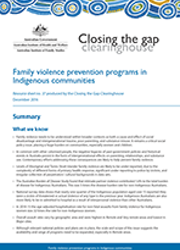Summary
Family violence is a very serious and widespread issue in Australia, and has become an area of growing public concern, and a key priority area for Australian and state and territory governments.
Poor family functioning and parenting can have considerable negative impacts on children (Silburn et al. 2006). Several published reviews conclude that children affected by family violence can have inadequate brain development, which affects every part of their functioning (1800 RESPECT 2014; Atkinson 2013; Carpenter & Stacks 2009; Edleson 1999; Humphreys et al. 2008; Kitzmann et al. 2003; Sety 2011).
Adverse effects can include depression and anxiety, cognitive functioning, developmental delays, and poor academic performance. Further, for older children and women, they can include sexually transmitted diseases, substance use, homelessness, and poverty (Hovane & Cox 2011). It can also force children into safe refuges or the care of relatives.
As acknowledged by several Prime Ministers, and documented in previous Clearinghouse publications (see for example, Atkinson 2013), Indigenous families and family/clan structures were severely damaged by past government policies and the colonial legacy (Haebich 2000), the consequences of which may still be evident.
Research in Australia as in other colonised societies has linked a collapse of traditional Indigenous institutions and roles to contemporary patterns of destructive behaviour, such as heavy alcohol consumption by a minority of Indigenous men and women. This in turn, is frequently associated with incidents of extreme interpersonal and intrapersonal violence and self-harm (Chandler & Lalonde 1998; Radford et al. 1991). Family violence therefore can be seen as both a cause and effect of social disadvantage and intergenerational trauma.
Summary
Introduction
Background
- The spectrum of interpersonal and family violence
- Burden on populations
- Hospitalisations
- Geographic contexts of Indigenous violence
- Use of specialised homelessness services
- Risk factors for family violence
- Terms used regarding violence in Indigenous communities
- The policy context
Family violence prevention programs
- Indigenous family violence prevention programs
Principles for successful programs
Gaps in the evidence
Conclusion
End matter: References; Acknowledgments; Abbreviations; Terminology; Funding; Suggested citation; Copyright



